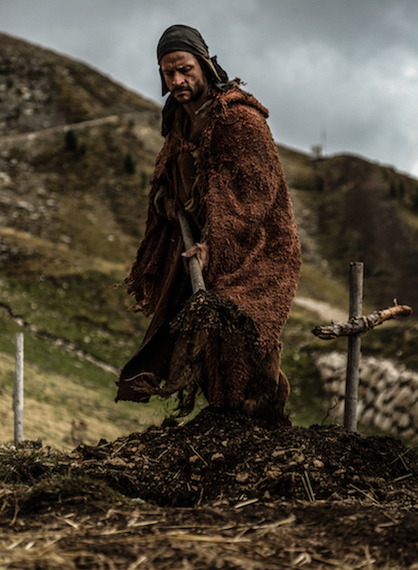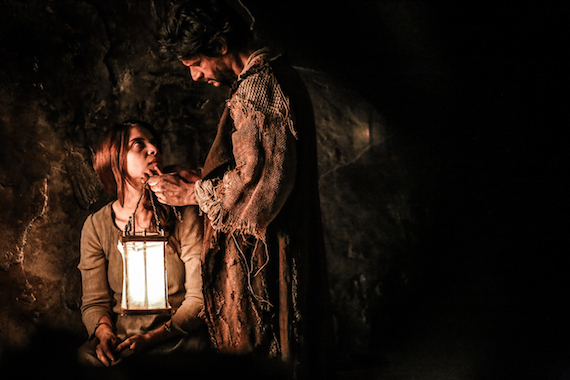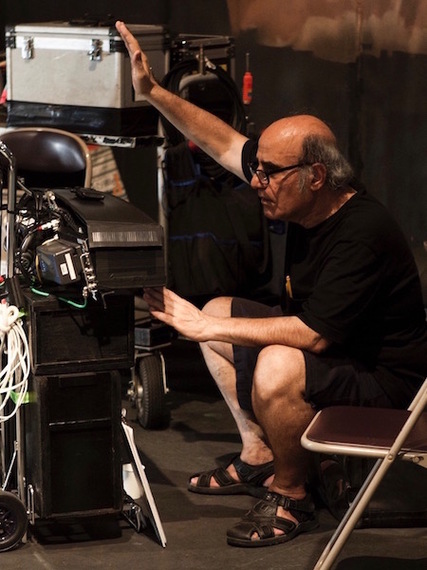Could Iranian-born filmmaker Amir Naderi have foreseen, through cinematic eyes, the earthquake that devastated Central Italy just over two weeks ago?
As I began watching Naderi's latest masterpiece Monte, I wondered if the rumble in the distance, ever present throughout his film, was announcing something prophetic. But then Monte and its own story, of survival at all costs, of loving someone so deeply that you allow them to do what they were always meant to do, and of changing the world -- and your destiny -- through sheer willpower, took over. And I became used to the ominous roar that had left me in tears during the first five minutes of the film.
Monte is a very special movie, by an exceptional filmmaker. To those who have never watched, The Runner and Cut, I say you've missed out. And to those who have watched 99 Homes, the quintessential American movie of the 21st Century, you know what kind of magic this man is capable of -- even if he just touches a script as the co-writer on a project.
In this tale set on the side of a mountain, in Northern Italy around 600 years ago, Agostino (Andrea Sartoretti) with his wife Nina (Claudia Potenza) and their son Giovanni (Zaccaria Zanghellini) try to exist, make a living in the mount's shadow. Most have left this ungrateful landscape, where only weeds can grow due to the mountain's impenetrable shadow, yet Agostino remains unmovable, convinced that his family's destiny is among those rocks.
Ultimately, Monte turns out to be a film about survival, but also what divides the men from the animals, so to speak. It's a spiritual movie without a God and a film about humanity's power to literally move mountains, if only we manage to work together. And believe.
I sat down for a long talk with the impossibly charismatic, charming, funny Amir Naderi and his wonderful, understatedly handsome star Andrea Sartoretti, on the Venezia 73 terrace. Monte premiered at the Venice International Film Festival and Naderi was awarded the Jaeger-LeCoultre Glory To The Filmmaker Award in Venice.
Our conversation inspired me beyond the words that were spoken among us three, as Sartoretti opened up the talk with his own special wisdom. And the visionary Naderi perhaps explains the feeling best in his last answer. But you'll have to read through to the end to get the full magic!
To me, this is a film that shows that man can conquer the impossible.
Andrea Sartoretti: May I say one thing? I think that this film is a film against destiny. There is no destiny, it's just man. Destiny doesn't exist. And in his life Naderi shows that, you build your destiny. This story speaks about a miracle without God. Man does miracles, not God.
Mr. Naderi, you did change your destiny. You have broken down all the walls that people could have built around you and have become this world famous filmmaker who makes films wherever he wants. How do you manage that?
Amir Naderi: At least I try. I believe all humans shouldn't go with the rules that life gives to us. I hate those. Humans should make their own rules, if they believe it. Everything came from belief, not because I want this or I want that. Because belief is really expensive if you want to go with it. You take a risk, you take a very very hard situation. I didn't like from the beginning my destiny, other people have a life, they have a wife, they have kids, to me it's very boring. Very good, but boring. I think life chooses some people to test them, to do things. I think life chose me, I didn't.
Naderi: Yeah, I know, I changed my destiny from when I was eleven. I left my city, came to the capital and made my film. Then in my twenties I went to London to watch movies and to live. Always I want to take risks because I have ambitions. If you are born with ambitions you'll be in trouble all your life. With ambitions, you don't like the ordinary things, you want to do something new, you want to do something impossible, you want to put yourself more and more in a hard situation and push your limit.
Sartoretti: Amir Naderi is a director who never cheats himself. He never cheats his style, if you look at his first film and you look at Monte, he never cheats his style.
Do you have a Giovanni, and a Nina in your life?
Naderi: No, my Giovanni is cinema. Personal life is zero in my life.
Sartoretti: I think his Giovanni is the cinema but also if you think in the film, Giovanni is cinema, and cinema needs light. The younger generations need light...
Naderi: I closed the door to any enjoyment in my life, I'm vegetarian, I'm not drinking at all, I don't smoke at all, I'm like a priest. All my life. I'm not in the crowd, I don't go to parties, I don't go to restaurants. Originality is important for me.
Andrea, what drew you to this role?
Sartoretti: I think that I met Agostino when I met Amir. Every day Amir told me one story of his life, every day. Every night, after dinner in my room, telling me a story of his childhood and every time the story was in me like a seed. And he knew that this seed will grow in me. It did, and it became Agostino.
 Naderi: I never talk cinema with my actors. I very slowly put myself in their mind and their bodies. If you come to my set, you'll see three or four Amirs. For me body language is important, and location, and I work on those things.
Naderi: I never talk cinema with my actors. I very slowly put myself in their mind and their bodies. If you come to my set, you'll see three or four Amirs. For me body language is important, and location, and I work on those things.
Sartoretti: He's right, a lot of times there were no words on the set, he would just look at me, and I understood.
Could you work with an actor you don't feel?
Naderi: Never, I am not casting. My heart is casting, not me. In the moment if my heart says yes then I try to get a relationship together.
Did you have an artistic vision for the film?
Naderi: Yes, I grew up with it, I educated myself. I don't think a museum exists in the world I haven't seen. I studied every page of art in this country for this film. Long before the film. Ask me why?
Why?
Naderi: Because I don't care about language. I don't need language. I try to go from the depth, and come up. I try to educate myself about what is this country. Why this country is this country. This country, I find it never has white, no white color anywhere. Nothing. Never white in any piece of art from Italy in the world. But if you go to England, you'll see white. America definitely you'll find it, because it comes from the modern esthetic. In Italian art, you never see red too much. In Caravaggio, there is a little bit of red, because red should have a language, a reason. Not just to make a painting. In my film you never see red, except in one moment, in the dream. Even on set, I said nobody should have a red jacket, no make up, nothing. This is my language about Italy.
And Andrea brings his spirit to it. Some people are born for cameras -- he is.
How do you feel when your filmmaker says something like this?
Sartoretti: I feel proud of my filmmaker. Yesterday when they gave him the [Jaeger-LeCoultre] award, I was moved.
Naderi: I am so glad to make the film in this country because this country is very difficult. Very logical, very critical, very gang-like. I came from outside... Seventy five people worked with me, I said to everybody, we are not making a movie. We want to go to war. The film is war, we want to go to war.
I can imagine the authorities here, hearing that an Iranian filmmaker wanted to go to war in Italy...
Naderi: I said we want to go to 2,700 meters up and live there. No cell phones, no personal life. I said to my actors, don't talk to anybody. And myself, I never talk with anybody, I didn't eat with them, they never saw when I came or left. To make you not so used to yourself, your body, your relationships. Otherwise the set becomes very cheap, you're just acting.
Can filmmakers change the world?
Sartoretti: Cinema changed my world, so I think it can change the world of everyone. I think Amir shoots films for that, to change the world and to explain it.
Naderi: The reason I don't have too much dialogue is that I want my idea to be universal. You can show it to an African or a Saudi. We all want to do something but our family, our life, our need for money stops us. This way, they can see that one man did it.
Sartoretti: Everyone has a mountain. Lucky people have one mountain. The majority of people have a lot of mountains. Immigrants, crossing the ocean in a rubber boat, for them the sea is a mountain.
Is Mr. Naderi a prophet?
Sartoretti: I don't think he is a prophet because he doesn't want to be a prophet.
Naderi: Can I ask a question? What do you think of this film, Andrea?
Sartoretti: I think what I thought when I was on the set. Remember when we had breakfast together I told you this. With this film, Amir is able to tell the "parcours" -- the path of humanity. That challenge makes man a man. Without a challenge a man is like a dog. This is to me the film and why I'm so proud. It's an enormous responsibly to do this.
Naderi: Everything in my films comes from obsession. My obsession with cinema. Should, not want. Want is a very bad word.
Sartoretti: He taught me, something I carry in my heart now. In the first days, if I wanted to change something or get his attention I'd yell "Amir, Amir, Amir!" and he said, no, don't shout. Never shout. He would take me four hundred meters from the set. And the first day he told me, "acting is private -- because if we speak of acting in front of people we lose the magic." We have the possibility to create magic but magic is really volatile. You can lose it in an instance.
Magic is the most beautiful word in any language.
Naderi: Yes, and you cannot buy it. Magic you should pay for it, with pain, of course, and if you clear yourself, magic is coming. You cannot push it, and if someone coughs... the magic is gone.
All images courtesy of La Biennale, used with permission.


